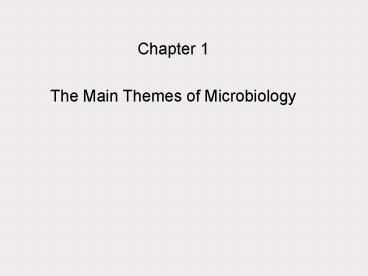The Main Themes of Microbiology - PowerPoint PPT Presentation
1 / 26
Title:
The Main Themes of Microbiology
Description:
The study of organisms too small to be seen ... Louis Pasteur and Robert Koch. 19. Louis Pasteur (1822-1895) Showed microbes caused fermentation and spoilage ... – PowerPoint PPT presentation
Number of Views:153
Avg rating:3.0/5.0
Title: The Main Themes of Microbiology
1
- Chapter 1
- The Main Themes of Microbiology
2
Microbiology
- The study of organisms too small to be seen
without magnification - Microorganisms include
- bacteria
- viruses
- fungi
- protozoa
- helminths (worms)
- algae
3
Branches of Study Within Microbiology
- Immunology
- Public health microbiology and epidemiology
- Food, dairy and aquatic microbiology
- Biotechnology
- Genetic engineering and recombinant DNA technology
4
Microbes are Involved in
- Nutrient production and energy flow
- Decomposition
- Biotechnology
- production of foods, drugs and vaccines
- Genetic engineering
- Bioremediation
- Infectious disease
5
Infectious Diseases
- Nearly 2,000 different microbes cause diseases.
- 10 billion new infections per year worldwide
- 13 million deaths from infections per year
worldwide
6
(No Transcript)
7
Characteristics of Microbes
- Procaryotes and eukaryotes
- procaryote microscopic, unicellular organisms,
lack nuclei and membrane-bound organelles - eucaryote unicellular (microscopic) and
multicellular, nucleus and membrane-bound
organelles - Viruses
- acellular, parasitic particles composed of a
nucleic acid and protein
8
(No Transcript)
9
Microbial Dimensions
- Procaryotes are measured in micrometers.
- Viruses in nanometers
- Helminths are measured in millimeters.
10
Historical Foundations of Microbiology
- 300 years of contributions by many
- Prominent discoveries include
- microscopy
- scientific method
- development of medical microbiology
- microbiology techniques
11
Antonie van Leeuwenhoek (1632-1723)
- Dutch linen merchant
- First to observe living microbes
- Single-lens magnified up to 300X
12
Spontaneous Generation
- Early belief that some forms of life could arise
from vital forces present in nonliving or
decomposing matter.
13
Scientific Method
- A general approach to explain a natural
phenomenon - Form a hypothesis - a tentative explanation that
can be supported or refuted by observation and
experimentation - A lengthy process of experimentation, analysis
and testing either supports or refutes the
hypothesis.
14
- Results must be published and repeated by other
investigators. - If hypothesis is supported by a growing body of
evidence and survives rigorous scrutiny, it moves
to the next level of confidence - it becomes a
theory. - If evidence of a theory is so compelling that the
next level of confidence is reached - it becomes
a Law or principle.
15
Discovery of Spores and Sterilization
- John Tyndall and Ferdinand Cohn each demonstrated
the presence of heat resistant forms of some
microbes. - Cohn determined these forms to be endospores.
- Sterility requires the elimination of all life
forms including endospores and viruses.
16
Development of Aseptic Techniques
- Dr. Oliver Wendell Holmes observed that mothers
of home births had fewer infections than those
who gave birth in hospital. - Dr. Ignaz Semmelweis correlated infections with
physicians coming directly from autopsy room to
the maternity ward. - (needed to wash their hands)
17
- Joseph Lister introduced aseptic techniques
reducing microbes in medical settings to prevent
infections - involved disinfection of hands using chemicals
prior to surgery - use of heat for sterilization
18
Pathogens and Germ Theory of Disease
- Many diseases are caused by the growth of
microbes in the body and not by sins, bad
character, poverty, or non germ related causes - Two major contributors
- Louis Pasteur and Robert Koch
19
Louis Pasteur (1822-1895)
- Showed microbes caused fermentation and spoilage
- Disproved spontaneous generation of
microorganisms - Developed pasteurization
- Demonstrated what is now known as Germ Theory of
Disease - Developed a rabies vaccine
20
Robert Koch (1843-1910)
- Established Kochs postulates - a sequence of
experimental steps that verified the germ theory - Identified cause of anthrax, tuberculosis (TB),
and cholera - Developed pure culture methods
21
Taxonomy Organizing, Classifying and Naming
Living Things
- Formal system originated by Carl von Linné
- (1701-1778)
- Concerned with
- classification orderly arrangement of organisms
into groups - nomenclature assigning names
- identification discovering and recording traits
of organisms for placement into taxonomic schemes
22
Levels of Classification
- Domain - Archaea, Bacteria and Eukarya
- Kingdom - 5
- Phylum or Division
- Class
- Order
- Family
- Genus
- species
23
Naming Micoorganisms
- Binomial (scientific) nomenclature
- Gives each microbe 2 names
- Genus - noun, always capitalized
- species - adjective, lowercase
- Both italicized or underlined
- Staphylococcus aureus (S. aureus)
- Bacillus subtilis (B. subtilis)
- Escherichia coli (E. coli)
24
Evolution - living things change gradually over
millions of years
- Changes favoring survival are retained and less
beneficial changes are lost. - All new species originate from preexisting
species. - Closely related organism have similar features
because they evolved from common ancestral forms. - Evolution usually progresses toward greater
complexity.
25
3 Domains
- Bacteria - true bacteria, peptidoglycan
- Archaea - odd bacteria that live in extreme
environments, high salt, heat and other hostile
conditions. - Eukarya- have a nucleus and organelles
26
(No Transcript)































